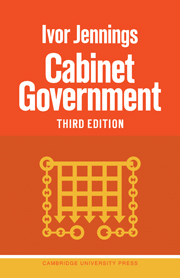Book contents
- Frontmatter
- Contents
- PREFACE
- CHAPTER I THE BRITISH CONSTITUTION
- CHAPTER II THE CHOICE OF A PRIME MINISTER
- CHAPTER III THE FORMATION OF A GOVERNMENT
- CHAPTER IV THE ADMINISTRATION
- CHAPTER V MINISTERS AT WORK
- CHAPTER VI INTER-DEPARTMENTAL RELATIONS
- CHAPTER VII TREASURY CONTROL
- CHAPTER VIII THE PRIME MINISTER
- CHAPTER IX THE CABINET
- CHAPTER X WAR AND DEFENCE
- CHAPTER XI ECONOMIC POLICY
- CHAPTER XII CONSTITUTIONAL MONARCHY
- CHAPTER XIII THE PERSONAL PREROGATIVES: DISMISSAL OF MINISTERS, DISSOLUTION OF PARLIAMENT, CREATION OF PEERS
- CHAPTER XIV PATRONAGE AND HONOURS
- CHAPTER XV GOVERNMENT AND PARLIAMENT
- APPENDIX I. GOVERNMENTS SINCE 1835
- APPENDIX II. EXAMPLES OF GOVERNMENTS
- APPENDIX III. THE PREROGATIVE OF DISSOLUTION
- APPENDIX IV. BIOGRAPHICAL AND BIBLIOGRAPHICAL NOTES
- INDEX
CHAPTER III - THE FORMATION OF A GOVERNMENT
Published online by Cambridge University Press: 23 September 2009
- Frontmatter
- Contents
- PREFACE
- CHAPTER I THE BRITISH CONSTITUTION
- CHAPTER II THE CHOICE OF A PRIME MINISTER
- CHAPTER III THE FORMATION OF A GOVERNMENT
- CHAPTER IV THE ADMINISTRATION
- CHAPTER V MINISTERS AT WORK
- CHAPTER VI INTER-DEPARTMENTAL RELATIONS
- CHAPTER VII TREASURY CONTROL
- CHAPTER VIII THE PRIME MINISTER
- CHAPTER IX THE CABINET
- CHAPTER X WAR AND DEFENCE
- CHAPTER XI ECONOMIC POLICY
- CHAPTER XII CONSTITUTIONAL MONARCHY
- CHAPTER XIII THE PERSONAL PREROGATIVES: DISMISSAL OF MINISTERS, DISSOLUTION OF PARLIAMENT, CREATION OF PEERS
- CHAPTER XIV PATRONAGE AND HONOURS
- CHAPTER XV GOVERNMENT AND PARLIAMENT
- APPENDIX I. GOVERNMENTS SINCE 1835
- APPENDIX II. EXAMPLES OF GOVERNMENTS
- APPENDIX III. THE PREROGATIVE OF DISSOLUTION
- APPENDIX IV. BIOGRAPHICAL AND BIBLIOGRAPHICAL NOTES
- INDEX
Summary
The Offices to be Filled
The offices to be filled when a new Prime Minister takes office are some ninety in number. They are not determined by law, and there is no legal distinction between a political and a non-political office. Some of them, indeed, are survivals of other times and other conditions. A Lord Privy Seal is usually appointed, though there is no Privy Seal office. A Chancellor of the Duchy of Lancaster has about two hours a week of office work. A Lord President of the Council has little more. The chief offices are, however, the key administrative positions. The Chancellor of the Exchequer, the Minister of Defence, the First Lord of the Admiralty, the seven Secretaries of State, the President of the Board of Trade, the Ministers of Labour and National Service, Health, Agriculture, Fisheries and Food, Education, Fuel and Power, Housing and Local Government, Pensions and National Insurance, and Transport and Civil Aviation, and the Postmaster-General, control the main functions of government. Each of them, too, has at least one political subordinate. The Ministers of Works and Supply and the Lord Chancellor also have important departmental duties. There may be five or six Ministers of State assisting the ministers mentioned above. The Attorney-General, the Solicitor-General, the Lord Advocate and the Solicitor-General for Scotland have duties which are, for the most part, not administrative. The Parliamentary Secretary to the Treasury and the Lords of the Treasury have some departmental duties in the Treasury.
- Type
- Chapter
- Information
- Cabinet Government , pp. 59 - 89Publisher: Cambridge University PressPrint publication year: 1959

